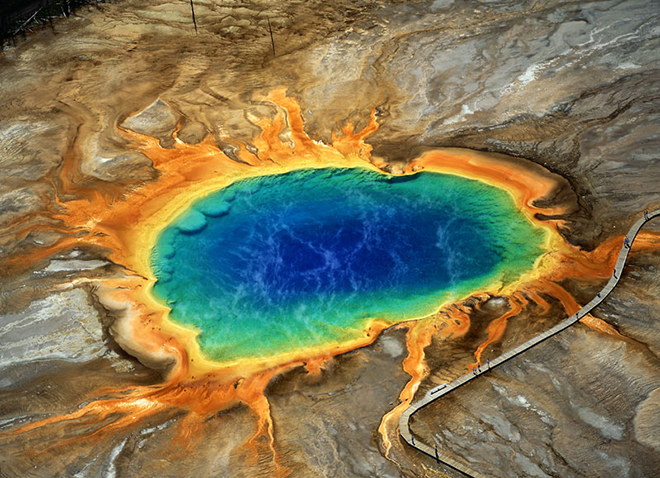
Grand Prism Spring, Yellowstone National Park
The Grand Prism Spring and many more massive boiling sulfur springs at Yellowstone National Park have brilliant colored bacteria, and the hotter the spring, the more vibrant the color of the bacterias, yielding rainbow ponds. This is the imagery behind Augustine's description of the worms that live in fire from the end of The City of God. The underlying idea is how Hell glorifies God, and the Extremophiles in these colorful pools may be a vestige of that imagery.
—Whether It is Possible for Bodies to Last for Ever in Burning Fire.
"What, then, can I adduce to convince those who refuse to believe that human bodies, animated and living, can not only survive death, but also last in the torments of everlasting fires? They will not allow us to refer this simply to the power of the Almighty, but demand that we persuade them by some example. If, then, we reply to them, that there are animals which certainly are corruptible, because they are mortal, and which yet live in the midst of flames; and likewise, that in springs of water so hot that no one can put his hand in it with impunity a species of worm is found, which not only lives there, but cannot live elsewhere; they either refuse to believe these facts unless we can show them, or, if we are in circumstances to prove them by ocular demonstration or by adequate testimony, they contend, with the same scepticism, that these facts are not examples of what we seek to prove, inasmuch as these animals do not live for ever, and besides, they live in that blaze of heat without pain, the element of fire being congenial to their nature, and causing it to thrive and not to suffer,—just as if it were not more incredible that it should thrive than that it should suffer in such circumstances. It is strange that anything should suffer in fire and yet live, but stranger that it should live in fire and not suffer. If, then, the latter be believed, why not also the former?"
~ Augustine of Hippo. City of God. Book XXI. Chapter 2.
http://www.ccel.org/ccel/schaff/npnf102.iv.XXI.html
Related: Augustine, Augustine of Hippo, Extremophiles, Fire, Grand Prism Spring, Hell, The City of God, Worms



February 13th, 2020 - 07:07
“It is strange that anything should suffer in fire and yet live, but stranger that it should live in fire and not suffer. If, then, the latter be believed, why not also the former?”
Unfortunately, Augustine knew nothing of evolution, and next to nothing about the central nervous system. Adaptability allows animals to move to zones in which their predecessors couldn’t have survived. He simply has his science backwards: It is reasonable, through evolutionary adaptability, that things should live in [not fire, but extreme heat] and not suffer, but stranger if it should suffer in extreme heat and still choose to live there.
In truth, it appears that animals originated near sub-oceanic volcanic vents, and that land-based reptiles and mammals are the extremophiles in a frigid sense!
https://www.youtube.com/watch?v=0cwvj0XBKlE
February 14th, 2020 - 11:17
Jim,
Thanks for reading and commenting on my blog post from 8 years ago. At the time I was trying to make sense of what Augustine was writing about eternal hell in the City of God. However, you are correct that these extremophiles are not suffering, so Augustine’s argument doesn’t hold.
Ultimately, Schleiermacher’s conclusion is correct: https://postbarthian.com/2018/05/01/friedrich-schleiermacher-eternal-blessedness-heaven-not-possible-eternal-torment-hell/
I should update this old post.
Wyatt